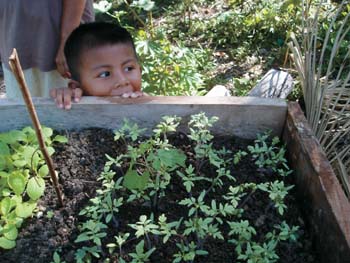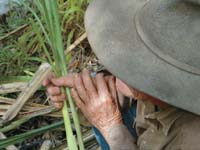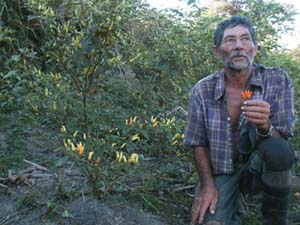 |
 |
| current issue |  |
past issues |  |
send a letter/news |  |
address update |  |
advertise |  |
about us |  |
alumni home |
Features
Planting HopePage 3 of 3
 A Mayan child in Belize, above, with seedlings headed for his family's garden. About 75 percent of the families Sustainable Harvest works with do not have access to fresh garden produce.
A Mayan child in Belize, above, with seedlings headed for his family's garden. About 75 percent of the families Sustainable Harvest works with do not have access to fresh garden produce.
|
Wedding invitations aside, Reed spends much of her time these days in the United States, overseeing the main office (now located in Surry, Maine) and concentrating on fund raising. "The hardest part of my job," she says, "is saying 'no.' For every family we take on, many more are waiting in line, hoping for assistance." In 2004, the Sustainable Harvest International program in Honduras became an independent affiliate (the Honduran staff now runs the show and looks for new resources), a development expected to help the organization expand its outreach, as other countries replicate this model.
To spread the word and increase support for her efforts, Reed launched a new venture this year called Smaller World Tours, which allows donors to see up close the work they have been supporting from thousands of miles away. This winter, on the first tour, Ron Poitras found himself bumping along in the back of an open pickup truck, trying to find a comfortable position as the driver maneuvered the deeply rutted mountain roads of Terreritos, Honduras. Poitras is himself an organic farmer, growing flowers and vegetables on his Small Potatoes Farm in Surry, Maine. He understands some of the challenges faced by these farmers. "It takes awhile to transition from one type of agriculture to another," he notes. "You can't just do a site visit, write something down, and say this should work well for you. You need someone on the ground, someone you can call on, someone who will be coming back, offering suggestions and assistance."
 A farmer in Honduras displays his crop of lemon grass, which makes a popular medicinal tea and an effective erosion barrier.
A farmer in Honduras displays his crop of lemon grass, which makes a popular medicinal tea and an effective erosion barrier.
|
During their nine-day trip, Poitras and a dozen others witnessed for themselves the success of this "on the ground" approach—and got a taste of what it's like to be a farmer in Central America. The travelers slept in a rustic hotel, ate beans and rice at every meal, and adjusted to life without hot water. Each morning they set out to visit a Sustainable Harvest International site. On one farm, they helped to build a chicken coop. On another, they helped construct an environmentally friendly stove. They learned how a biogas generator works, climbed through steeply terraced corn fields, and saw thriving organic vegetable gardens.
More than any single experience, though, the Smaller World travelers came away touched by the lives they saw—joy in the midst of extreme poverty, hope in the face of hardship. They saw how deeply entrenched cultural attitudes have begun to shift—from desperation to self-sufficiency—and that for the first time, there is a sense of possibility, a vision for a better future. "If we could just get more people to see what's going on here," says tour participant Tony Barrington, "the difference being made in people's lives. This is such a great model."
Of course, farmers like Juan Alberto Pérez need no convincing. In the past three years, with help from Sustainable Harvest International, Pérez and his three brothers have planted more than 11,000 fruit and forest trees, transforming their once-barren land in Pinabete, Honduras. On a cool morning last spring, Pérez was at work in his fields, adding to the neat rows of trees. He dug a handful of soil from the ground and plunked in a seedling, a tiny mahogany tree about seven inches tall. Its lustrous leaves fluttered slightly in the breeze. He tamped the soil firmly around the tender roots, then moved on, stooping and planting, stooping and planting. For Pérez, it was just another morning of work.
 Don Cheyo's Tabasco peppers increased his annual income from $900 to nearly $4,000.
Don Cheyo's Tabasco peppers increased his annual income from $900 to nearly $4,000.
|
But for Sustainable Harvest International, Pérez's little mahogany seedling was a milestone: it was the millionth tree. One million trees closer to restoring the rainforest, the water supply, the precariously tipping ecological balance. "It was a great joy to know that we were the ones who planted this tree," says Pérez. "We must leave behind the time of just cutting the trees without planting anything. We must plant, care for and use the trees in ways that guarantee that we will always have a forest." And Pérez has an even greater vision: "I hope," he says, "that soon we will arrive at two million, then five million."
And so Reed's vision continues to grow. Slowly but steadily, like the rhythmic cadence of those machetes at work, the word is spreading—one farmer, one field, one seedling at a time.~
Page: < Prev 1 2 3
Easy to print version
blog comments powered by Disqus

